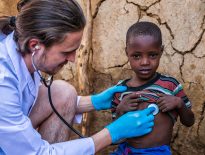There are times when we feel that life is hard and that some challenges are beyond our power. But when we look around us, at people like Ben Underwood, we realise that we are not only unaware of the gifts we have been given, but also of the immense power to enjoy life even when those gifts are denied us.
Ben Underwood was born on a winter’s day in sunny California in 1992. Up until the age of two, his childhood was ordinary, marked by the energetic and cheerful personality of his mother, Aquanetta. But one evening, Aquanetta noticed a white spot in Ben’s right eye, like a tiny pearl. Within a few days it had grown, so she worriedly took him to an ophthalmologist. Tests revealed an eye cancer called retinoblastoma, which usually affects children under the age of two. The news was devastating for Aquanetta, whose father had died of cancer.
Doctors struggled for a year to remove the malignant tumour with chemotherapy and radiotherapy, but the unsatisfactory results left the mother with an extreme solution: to remove the eyeballs to prevent the cancer from spreading to the optic nerve and then to the brain. At just three years old, little Ben was greeted in the post-operative recovery room by his mother, fighting back tears and trying to distract him from his fear of never seeing her again. She put his hands on her face, gave him her hands to smell, and said, “Ben, you can still see me, baby. You can see me with your hands: you can touch me. You can still see me, Ben, with your nose: you can smell me. And with your ears too. Ben, you can see me with your ears. You can hear me.” At that moment, she vowed to help Ben never think of himself as limited because of his disability.
Immediately after leaving hospital, Ben would always be with his brothers, Derius and Isaiah, touching everything that came his way and identifying objects with their help. Because his mother always told him that he was a normal child, Ben participated in all activities with his brothers and classmates. He was at camp and only seven years old when he discovered an unusual way of getting around.
In a way that no one can explain, Ben taught himself to use echolocation to identify objects around him. With a click of his tongue, he would emit sounds that, when picked up, would turn into images of his surroundings. Mostly used by some mammals, echolocation is theoretically possible in humans, but only a few are able to master it. Of these, Ben has proved to be the most effective. When the doctors examined the area of the brain activated by echolocation, they found that it was the visual area that decoded the information. Ben was therefore able to see again, literally. For his mother, echolocation was the answer to her prayer to see Ben happy and independent.
Without ever using a blind person’s cane, Ben learned to walk, ride a bike, rollerblade and skateboard, play basketball and football, and climb trees without any major problems. “The happiest boy in the world,” as his mother used to call him when he was little, had lost none of his curiosity, energy and good humour. In fact, there were countless times when people didn’t believe him when he told them he was blind.
His wonderful ability has brought him popularity, and Ben has appeared on popular shows such as Oprah Winfrey and Ellen DeGeneres. His message is simple, and is designed to help and give a different perspective on the limitless possibilities of people with disabilities. To help others in a practical way, he has taken part in various tests organised by researchers who wanted to find out as much as possible about his abilities and the ways in which they could be acquired.
Passionate about video games and Japanese culture, Ben had started studying for university in Japan when the same cancer that had taken his sight returned. In between chemotherapy sessions, he continued to attend events to inspire others. According to his mother, he was neither angry nor unhappy towards the end. On his last trip home from hospital, he hummed a song while his mother cried in the car. He promised her that they would see each other again, and they both believed it with all their hearts.
Aquanetta says one of the best things Ben left behind was the ability to always see things from the inside. He was able to sense someone’s feelings better than those around him because he paid attention to them. When he heard that someone was offended by their appearance, Ben would always say: “That’s what’s wrong with sighted people, you all look at one another and judge what you look like.” From this perspective, the world would certainly be a better place if we couldn’t see.



















